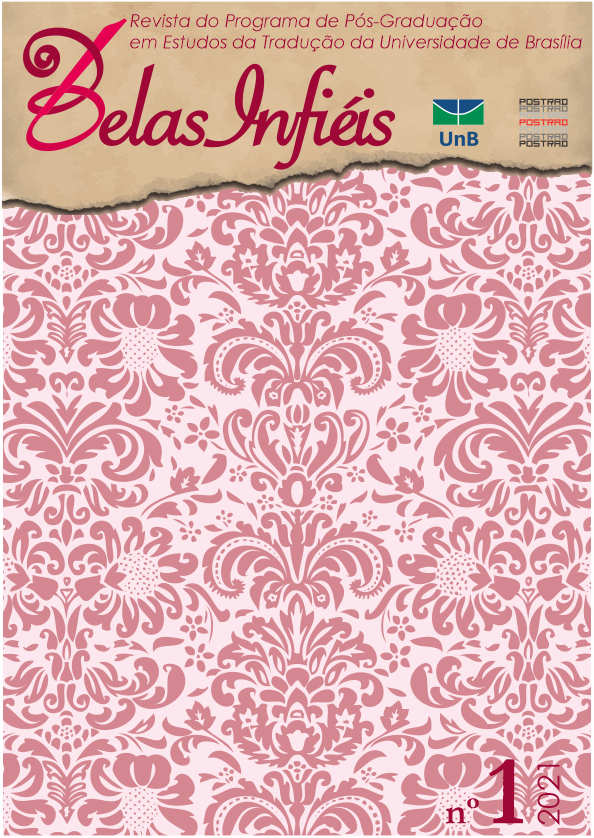A intertextualidade como chave de leitura para a alegoria do poema Nux, atribuído a Ovídio
DOI:
https://doi.org/10.26512/belasinfieis.v10.n1.2021.32431Palabras clave:
Ovídio. Nux. Alegoria. Intertextualidade. Roger Beck.Resumen
Em trabalho intitulado Ovid, Augustus, and a nut tree, Roger Beck (1965) propôs uma leitura de Nux (“A nogueira”) como se o poema fosse uma alegoria do exílio de Ovídio. Para tal, o estudioso coligiu algumas passagens do texto e os interpretou à luz dos Amores e das Epistulae ex Ponto. No presente artigo, a partir de excertos do poema Nux, acompanhados de nossa tradução para os mesmos excertos, retomaremos o raciocínio de Beck, somando à referida análise intertextual diversos trechos dos Tristia que também parecem servir como chaves de leitura para a alegoria enunciada pela nogueira ovidiana.
Descargas
Citas
Bekc, Roger. (1965). Ovid, Augustus, and a Nut Tree. Phoenix, 19(2), 1965, 146–152. JSTOR.
Disponível em: www.jstor.org/stable/1087021. Accessed 28 May 2020.
Bohm, Arnd. (2006). Wordsworth's “Nutting” and the Ovidian Nux. Studies in Romanticism, 45(1), 25-48. Boston University.
Conte, Gian Biagio. (1999). Latin literature: a short history. J. Hopkins.
Erasmus. (1976). Commentary on Ovid’s Nut-Tree. In Elaine Fantham & Eriak Rummel (Eds.). Collected Works of Erasmus: Literary and Educational Writings. (A. G. Rigg Trad.). 7, ed.. Toronto & London: University of Toronto.
Fiorin, José Luiz. (2005). Interdiscursividade e intertextualidade. In Beth Brait (Org.). Bakhtin. Outros conceitos-chave (pp. 161-193). São Paulo: Contexto.
Fowler, Don. (2000). On the shoulders of giants: intertextuality and classical studies. In Roman constructions. Readings in postmodern Latin. Oxford University.
Ganzenmüller, Carl. (1910). Die Elegie Nux und ihr Verfasser. Kommissionsverlag der J.J. Heckenhauerschen Buchhandlung.
Gow, A. S. F. & Page, D. L. (1968). The Greek Anthology: The Garland of Philip. Vol. II. Cambridge.
Halm, C. (1852). Fabulae Aesopicae Collectae. Leipzag: B. G. Teubner.
Hendren, Thomas George. (2013). Ovid, Augustus, and the exilic journey in the Tristia and Epistulae ex Ponto. [Tese de Doutorado, University of Florida]. Disponível em: https://ufdc.ufl.edu/UFE0045161/00001
Knox, Peter E. (2009). Lost and spurious works. In E. Peter Knox (Ed.). A companion to Ovid. Blackwell.
Kristeva, Julia. (1967). Bakhtine, le mot, le dialogue et le roman. Critique. Revue générale de publications. Paris, 29, fasc. 239, 438-465.
Lausberg, Heinrich. (2011). Elementos de Retórica Literária. (R. M. Rosado Fernandes, Trans). 6ª edição. Lisboa: Fundação Calouste Gulbenkian.
Lee, A. G. (1958). The authorship of the Nux. In Herescu, n. I. Ovidiana, Recherches sur Ovide publiées à l'occasion du bimillénaire de la naissance du poète. Paris: Société d'Édition ‘Les Belles Lettres’.
Melo, João Victor Leite. (2019). Tradução poética de Ibis, Nux e Halieutica: três poemas de uma suposta quarta fase ovidiana. [Dissertação de Mestrado em Letras – Estudos Literários. UFJF].
Ovid. (1957). The art of love, and other poems. (J. H. Mozley, Trans.). Cambridge, Massachusetts: Harvard University Press.
Ovide. (1987). Tristes. (Jacques André, Texto estabelecido & Trans). Paris: Belles Lettres.
Ovídio. (2009). Cartas Pônticas. (Geraldo José Albino, Trans.). São Paulo: Martins Fontes.
Prata, Patrícia. (2007). O caráter intertextual dos Tristes de Ovídio: uma leitura dos elementos épicos virgilianos. [Tese de Doutorado em Letras Clássicas – Instituto de Estudos da Linguagem, Universidade Estadual de Campinas].
Prata, Patrícia. (2017). Intertextualidade e literatura latina: pressupostos teóricos e geração de sentidos. PhaoS Revista de Estudos Clássicos, Campinas, 17(1), 125-154.
Pulbrook, R. M. P. (1985). Ovidi Nasonis Nux elegia. Maynooth University.
Richmond, John. (2002). Manuscript traditions and the transmission of Ovid’s Works. In Barbara Weiden Boyd (Ed.). Brill’s companion to Ovid. Leiden, Boston, Köln: Brill.
Rodrigues, Nuno Simões. (2010). O exílio de Júlia Menor In Maria Cristina de Sousa Pimentel & Nuno Simões Rodrigues (Coords.). Sociedade, poder e cultura no tempo de Ovídio. Coimbra: FCT.
Tavares, Hênio. (1996). Teoria Literária. Belo Horizonte: Villa Rica.
Descargas
Publicado
Cómo citar
Número
Sección
Licencia
Derechos de autor 2021 CC BY

Esta obra está bajo una licencia internacional Creative Commons Atribución 4.0.
Copyright Statement
Given the public access to this journal, the texts are free to use but requires the recognition of the original authorship and initial publication in this journal to be properly stated.
The journal allows the use of works published for non-commercial purposes, including the right to submit the work to publicly accessible databases. Published contributions are the sole and exclusive responsibility of the author(s).
- When submitting papers to be evaluated by the Belas Infiéis journal, the author(s):
- Declare that the contents of the contributions are original and of their original creation, being entirely responsible for their content if there is an objection by third parties.
- Claim to be aware that they should not commit academic plagiarism.
- Declare that the manuscript has not been published, completely or partially, in Portuguese or another language. If it is a translation it should be submitted to the Translated Articles section.
- Declare that the manuscript is not being evaluated by other journals.
- Declare that the manuscript was not submitted to another journal simultaneously.
- Commit(s) to inform the journal of any kind of error or inaccuracy in their contribution (published, in evaluation or in editing) and to collaborate with the editors to make due corrections of the article (when in evaluation or editing) or erratum/retraction (after publication).
- Declare that there is no conflict of interest regarding the published work.
- Authorize its release if it is accepted for publication without any kind of monetary compensation.
- Agree to assign non-exclusive rights to publication to the magazine, remaining free to make their contribution available in other media as long as the publication of the first version in Belas Infiéis magazine is mentioned. They also authorize Belas Infiéis to assign their texts for reproduction in content indexers, virtual libraries and similar platforms.
- Maintain copyright and grant the journal the right of first publication, the work being licensed under theCreative Commons Attribution License.
- Is/Are allowed and encouraged to publish and distribute their work online after the editorial process, which may increase the impact and citation of the published work.
- Authorize the editorial team to make textual adjustments and to adapt the article to the publication rules, when necessary.



















